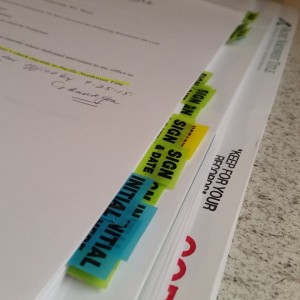Why invest in mortgage notes?
Let’s face it, if you want big returns on your investment, you will need to invest in an area that is profitable, relatively safe, has value, and has great return. Investing in mortgage notes is the simplest way to ensure a solid return backed by secured assets that you can control without any significant amount of risk. Let’s see how it works.
So, what exactly is a mortgage note?
Homebuyers need to sign a mortgage note and a promissory note, when they buy a house with mortgage [or a Trust Deed in many western states].
Promissory Notes
 Promissory note is the deed of agreement you have with your bank when you take out a home loan. By signing this contract, you promise to the bank that you will repay the loan according to the terms and conditions mentioned in the agreement. The bank will hold this document until you pay back the borrowed amount with interest in full.
Promissory note is the deed of agreement you have with your bank when you take out a home loan. By signing this contract, you promise to the bank that you will repay the loan according to the terms and conditions mentioned in the agreement. The bank will hold this document until you pay back the borrowed amount with interest in full.
Mortgage Note
The mortgage note is signed to provide evidence and security for the loan, and it describes the terms and conditions under which the money has to be repaid. This legal document contains standard covenants between the lender and borrower. The lender will also hold this document until the loan is fully paid off. Once the loan is paid, the lender will record a release of mortgage or a re-conveyance of deed.
First and Second Mortgage, what are they?
First and second mortgages are both loans with your house as collateral, but the first mortgage (also called first lien) has the primary claim on the property. It takes precedence over all other subsequent claims (called junior claims).
Now if the borrower defaults on the loan and does not pay the due debts, then the property can be sold to satisfy the debt. In such case, first mortgage has the primary claim on a property and will be paid first.
The second mortgage is what the banks describe as a home equity loan. This allows a homeowner to tap into the home equity to borrow money rather than taking out a personal loan, and use it for home renovation or business capital and such.
What happens to a Mortgage after Origination?
 When you get a mortgage, you may think that the lender will hold and service your loan until you pay it off or sell your home. That’s often not the case. In today’s market, loans and the rights to service them often are bought and sold. In many cases, the company that you send your payment to is not the company that owns your loan.
When you get a mortgage, you may think that the lender will hold and service your loan until you pay it off or sell your home. That’s often not the case. In today’s market, loans and the rights to service them often are bought and sold. In many cases, the company that you send your payment to is not the company that owns your loan.
Once a lender originates a loan, it rarely stays in their possession. The mortgage note is sold into the secondary market, usually as part of a larger pool of notes. From there, depending on the performance of the note, it’s usually held by the Buyer of the pool of notes, who either services the notes themselves or subcontracts them out to a Servicer. A Servicer is a company that’s licensed by the various states to collect on behalf of the Buyer.
Investing in Real Estate vs. Investing in Mortgage Notes
Investing in real estate is profitable and has high return on your investment. However, it requires some knowledge of real estate, license and large amount of investment. Investing in mortgage notes has some distinct advantages. First of all, instantly there’s an immediate discount, even on a single note, and significant discounts when notes are purchased in bulk. Secondly, it’s a lot easier to manage mortgage notes, than it is to manage property.
Investing in First vs. Second Mortgages
 The first mortgage is the original loan taken out when the house is purchased. The second mortgage may also be taken out at that time or at a later time as a home equity loan. First and second mortgages are both secured loans secured by your property. However, the second mortgage notes are much less expensive.
The first mortgage is the original loan taken out when the house is purchased. The second mortgage may also be taken out at that time or at a later time as a home equity loan. First and second mortgages are both secured loans secured by your property. However, the second mortgage notes are much less expensive.
Conclusion
There is a whole market of mortgage notes out there, that you can simply tap into and start making profit without a significant amount of investment and without many hassles. You need to know a few tricks and tips of the mortgage notes, how to get a discount and low performing note, and how to manage those using simple rules and methods.
To start investing in mortgage notes, you need to understand what mortgage notes are, how to find them and how to understand contracts. All these processes are easy to learn; anyone can do them, doesn’t require a whole lot of investment and are relatively risk free. Interested?
To learn more about investing in mortgage notes, contact us at Keyhole Academy. Got a question or comment? Please don’t hesitate to put down your thoughts in the comment box below. Also, it would be really great if you visit our Facebook page and like it as well.
Source: Keyhole Academy


Ho ho, who woulda thunk it, right?